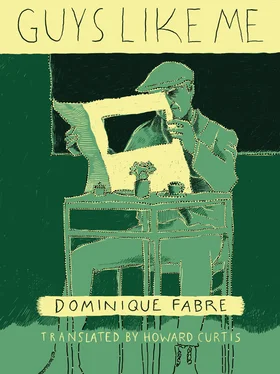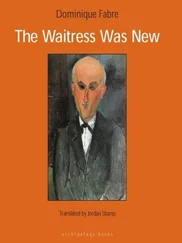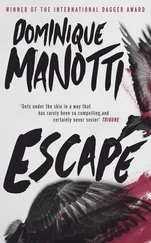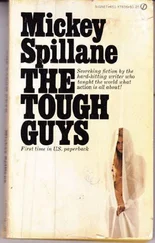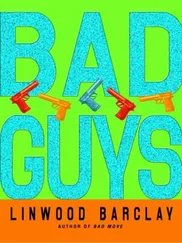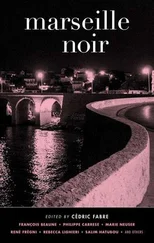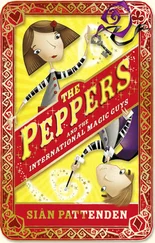When I left work, I wouldn’t stop to have a beer or a coffee in the bar at the end of the street, the way I used to, I’d go straight to Brochant on foot. I’d walk in the company of the trees as far as the darkness on the ground floor of Marie’s building, to pick up her mail. The operation had gone well but she was extremely tired, quite apart from the treatment she was starting. She was worried, how was she going to stand it? Some friends of hers had painted a picture of it that terrified her, plus, what made her sad was seeing all these people alone in life, apparently. How to find the strength to get out of their ward in the hospital, to go where?
Two days after the operation, I went to help Benjamin put his things in storage. I stayed in the locker he’d rented at the port, I arranged the things as best I could to fill the space. Anaïs had marked all the boxes: their departure was very well organized. His mother and I had lived in Gennevilliers for two years, in my head it was still a place where I’d dissipated my youth, along with a few other places in the Hauts-de-Seine, with Marco most of the time. In the aisles of the storage facility, Africans with rap in their ears and sometimes betting slips from the horse races in their hands made the rounds, I also saw dogs with their handlers in the aisles. Behind the row of birches on the edge of the site, you could see the high fence of the port, and beyond that, a whole heap of places whose names I couldn’t remember, but which I’d crisscross as soon as I had my scooter and Marie had recovered as I hoped she would. I could take photographs. They’d gone back to load the J7 with the last boxes and my son had suggested I wait for them, Anaïs had left with him. Right, so we’ll see each other at the airport, then? She and I had kissed and I’d realized that it was almost as if I was grieving, in a small way, but it probably wouldn’t be the last time.
They took almost an hour to finish loading and come back. I was exhausted after the last two weeks, dividing my time between the office, Beaujon, Marie’s apartment, and mine. That was why I didn’t look at myself too closely in the mirror, in the morning or at night, because I wasn’t too curious to know what I looked like at such moments. Probably another guy like me, old chap . He was really fascinating, that man. He was a poor guy from the sticks, and when he reached the bright lights, he started to have his doubts, things weren’t any better here than there. He messed up his life, without meaning to. There were probably millions like him on both sides of the ocean. Who could I talk to about that? Marc-André and I had supported each other quite a bit on the phone lately. His son had lost ten pounds in a month since he’d stopped his treatment. Marco was scared that he’d go back to his habit. Marie was very anxious, and Benjamin’s leaving was weighing on my mind. I still bore just as much of a grudge against my life, in a way. For many years, you had to fight against the sensation of living for nothing, and then, when you thought you more or less knew why, the reason could disappear like that, and you realized you’d been tricked. How could you get over these things? Of course, Marco knew all this as well as I did and he didn’t have the answer. Neither did I. When can we meet? We asked each other that every time. I’ll call you when I can.
Aïcha always asked me to give Marie her regards, and then we’d call each other again two or three days later, to chat. The trips to Beaujon were starting to get on my nerves. I realized that one evening on my way there: since the birth of my son, I’d only ever set foot in there for bad news, a stay in the hospital when I was fifty, and two deaths.
Marie read a lot. When I arrived, she was often also asleep. As soon as she was able to get up after the operation, she started taking care of herself, she put on make-up, she didn’t want to let herself go. I went to the cosmetics department of Printemps with a tube of lipstick, she wanted me to find the same one. I liked doing that a lot. She’d put on perfume, she could still stand Chanel No. 5.
“I don’t smell of illness, do I? You wouldn’t lie to me?”
Her girlfriends came to see her almost every day. I’d already seen some of them at her place, she’d talked about them for months on the internet, the others too, now I’d see them arriving with flowers or candy. When they left Marie would give it all to the nurses, and to the nurses’ aides who cleaned the corridors and the wards. Little by little, seeing her living like that, almost furtively, I told myself that she was a real chance for me. She’d received a postcard from Benjamin and Anaïs. Show me, did you really? She would have to stay here almost another month, for short periods. Later, there would be outpatient radiation therapy, and then it would be over, that was what everybody hoped. Sometimes we actually managed to be alone for a while, she and I. She didn’t know what had happened to the young woman she’d seen when she first came. It had been really depressing, hearing her get up at night, call for help in a low voice, then go and spew her guts out. In Beaujon, so close to the Seine, so close to where Marco and I both lived, you were already far from other people, from life as it goes on.
One time, I told Marie that when Benjamin was born I’d gone down to the emergency room to phone my parents who were asking for news. A hairy young guy button-holed me, he wanted to scrounge a little money from me, I told him to leave me alone, I had other things on my mind, I’d just had a child! He gave me a crooked smile and said: you’ve just had a kid and you don’t even want to stand me a drink to celebrate? He turned around, genuinely disgusted. I’d never forgotten that, though I didn’t really understand why it had made such an impression. Do you mind if I pull down the curtain? Benjamin knew that story by heart, he’d always listened to it politely, as if to say, why did that memory matter so much to me?
“You should have had a drink with him,” Marie said, “that way you wouldn’t have thought about it anymore.”
Then she asked me to sit down next to her and we stayed like that for a while, looking toward the other bank of the Seine. She didn’t feel too bad. Most of the time she didn’t feel anything. She spent her time not feeling anything. She was waiting. It was too hot in Beaujon. The last days of April and the first days of May, I was pleased that month was coming, with its long weekends and its public holidays. I was exhausted. I’ve never in my life been good at doing lots of things at the same time.
When I left Marie, she was tired.
“Do you need anything?”
She summoned up the courage to smile, and I don’t think she was faking it. Well, maybe sometimes.
“Yes, I need you to get rid of my cancer, could you do that for me?”
She never asked me to leave. Whenever I went, she would turn her head toward the window of her room, sometimes she had to put on her sunglasses, and it was if she was waiting her turn in a detox center or something like that. But we were out of luck. All I could do was tell myself crap like that. I looked on the internet two or three times, I bought magazines with articles about breast cancer, but there were never any answers to the questions I asked myself. They were irrelevant, obviously. What did she think about during all those hours of waiting? Everything and nothing. She tried above all not to ask herself too many questions, she told me she was trying to stop wondering why. “Why” kills faster than any other word.
The doctors had told her she would lose her hair. She didn’t know when. She didn’t want to wait. She was going to have her hair shaved off and buy herself a wig the following week, when she left the hospital. I offered to come with her, but she wouldn’t hear of it. She wanted to hear about the Brasserie Wepler, or for me to tell her about the boulevard, the trees on her street, she missed that, her life, her friends, her neighbors, and all those people she met in the clinic, her love of the night people, as she called them. She unwittingly came out with these grand but simple phrases. Damn Mr. F. Scott Fitzgerald, old chap . We hadn’t led the same life at all, she and I. They kept her in for a few more days after the first chemo, to see how she reacted. Then they let her go. Marie didn’t have any family, she’d dumped them the day she turned eighteen, but that didn’t mean she was alone. I liked seeing her surrounded by her girlfriends, and when I was there, they all looked at me in the same way, they all gave me the same slightly vague, slightly fake smile, a bit like, when you’re hiring, you smile at the applicant as you ask him to sit down. But I was probably just imagining things.
Читать дальше
